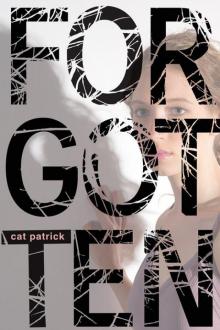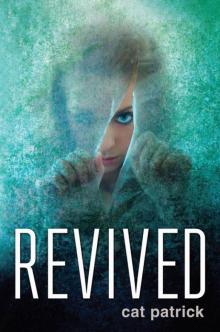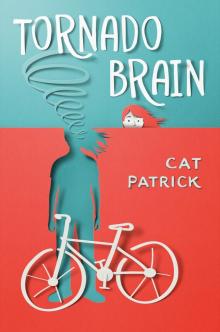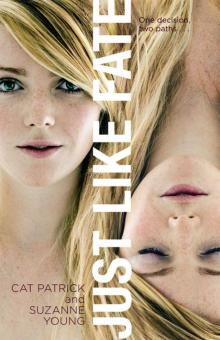- Home
- Cat Patrick
The Originals Page 2
The Originals Read online
Page 2
“First, I want to say that we’re lucky that it’s taken this long for noticeable differences to crop up,” she says. “I was fearful every day through puberty, and yet thankfully, that wasn’t an issue.” I don’t have to look at the others to know they’re blushing, too. Nobody wants to hear their mother say the word puberty.
Mom goes on.
“But now, it’s grown obvious to me that Lizzie is developing more right-brain tendencies,” she says, looking into my eyes. “I’m sorry, Lizzie, I thought that by allowing you to be the one in those classes at school, you’d grasp them more easily. I thought maybe I was doing a poor job of teaching them. But it seems that math and science just aren’t your forte.” Mom gives me a sympathetic smile that’s completely annoying.
“But if today is any indication, our current setup isn’t working,” she continues. “We’re not even three weeks in and already it’s clear that to remain on this path could draw attention to us, and therefore threaten everything. Because of this,” Mom says, shifting like she’s bracing for a triple teen outburst, “I am switching junior year assignments.”
I feel myself stiffen; Ella sucks in her breath.
“Are you serious?” Betsey asks. Mom nods.
“Ella will take first half,” she says authoritatively, but not meeting Ella’s eyes, probably because she knows how disappointed Ella’s going to be to miss out on cheer practice. “Lizzie will take second half. Betsey, you’ll stay with evenings.” Betsey visibly relaxes in her chair.
“But we have the schedule down,” Ella says in protest. “This isn’t fair.”
“I know,” Mom says. “But you’ve made straight A’s your whole life. You just transferred—and Principal Cowell specifically commented on your high marks. If suddenly you start getting C’s in math, it’ll attract attention. And beyond that, it’s time to start thinking of college. Of your future.”
Start thinking of college? I feel like she’s been thinking of college since we were two days old. The funny thing is that none of us knows how we’ll even handle college logistically, so we’ve all just put our heads in the sand about it. I blow out my breath, but everyone ignores me.
“So, it’s settled then,” Mom says, checking the clock again as she stands up. “I’ve got to get back to the hospital.”
“How soon?” I ask, knowing that I need to brush up on the cheers Ella’s learned so far. My stomach lurches at the thought of manufacturing pep.
“I called the school and told them that you had a migraine today,” Mom says. “I talked them into letting you retake the quiz.”
Nerves rage in my insides—I can feel mine, and the others’, too. She can’t be saying what I think she’s saying. “How soon, Mom?” I ask again.
She looks at the clock one more time, then looks back at me.
“Tomorrow.”
two
“Don’t forget to take off your nail polish.”
Mom’s talking to me from the kitchen doorway on the morning of the most last-minute, massive switch we’ve ever done. It’s ironic that she’s nagging me: She’s the one who left five minutes ago to mail bills before homeschool, then came back because she forgot both the bills and her car keys. I roll my eyes at her and she leaves, then I look down at my perfectly painted white nails.
“Why do yours always chip so easily?” I ask Ella, frowning. She shrugs, her eyes on the valley below our house. I know she’s upset about the switch, too. She stands and takes her cereal bowl to the sink before disappearing, probably to brush her teeth. Again. I shove back and go upstairs, then wander down the hall toward Mom’s room in search of remover.
I open the door to the cool, dark room and flip on the overhead light. As I squish across the carpet, I glance over at the three baby portraits in thick brown wooden frames, hung art-gallery straight on the wall with the door. I feel a familiar prickling on the back of my neck as I stop for a long look.
Anyone else would see the same kid wearing different outfits and expressions, but really, it’s different people. Ella’s openmouthed; Mom said she was mesmerized by a butterfly on a stick that the photographer used to get her attention. Her background is department store all the way. In her photo, Betsey’s drooling like a Saint Bernard. And I’m crying, probably because someone put me in a bucket.
What makes the hairs on my neck and arms stand up is that there’s another picture in a drawer somewhere—just a four-by-six snapshot taken by a proud parent—and the baby in the photo looks identical to the babies on the wall. Somewhere, there’s a photo of the Original, the baby who died.
The baby Mom cloned to make us.
“What are you doing in here?” Bet asks behind me, scaring me so badly that I bang my shoulder on the wall when I jump back. “Sorry,” she says, laughing. Bet’s always been a fan of frightening others.
“I’m getting nail polish remover,” I say, turning away from the faces that started as someone else’s.
“And visiting the Wall of Fame,” Bet says, waving at the photos. “God, Ella was a weird-looking baby.”
I chuckle, then we’re quiet a second. “Doesn’t it ever freak you out?”
“What?” Bet asks.
“That we’re not… normal,” I say.
“Lizzie, don’t be dumb. We’re normal,” Betsey says, shaking her head at me. “We just happened to be cloned instead of made the regular way.”
“I don’t know,” I say. “Sometimes it makes me feel inferior.”
“Well, it shouldn’t,” Bet says. “You’re awesome. But you know what? Mom’s going to make us both feel inferior if we don’t get our homework done because we’re standing around gawking at our baby selves. You’re already on her list this week; why make it worse? Let’s go.”
I allow myself to be dragged by the hand toward the door of Mom’s room, wondering whether the kids at school would consider clones unnatural; wondering what they’d think if they knew the truth. My fingernails are still painted, and as I flip off the light behind me, my neck is still prickling, too.
“Here,” Ella says, holding out the necklace at lunch. We’re on the front porch and the car is idling; I was the one waiting this time.
“Thanks,” I say, taking it and putting it on, thinking that to anyone else, the necklace probably looks like a family heirloom: a locket containing tiny photos of those I love. But it’s a lot more than that.
“Everything go okay this morning?” I ask.
“Yeah, fine,” Ella says, blowing out her breath. “Classes were okay; I talked to that David guy a little in student government.” She pauses, eyeing me for a few seconds before adding, “And… I aced the quiz.”
Ella wrote down the classroom numbers, but still, I’m edgy as I walk into Spanish III that afternoon. Instinctively, I make my way to our seat: front row, closest to the right wall. It’s the one we choose in any classroom, assuming we’re given a choice. We do it mostly for convenience’s sake—sometimes someone gets sick and we need to fill in for each other—but I’m not saying one of us (ahem, Betsey) doesn’t have a few obsessive-compulsive tendencies, too.
I settle into the chair, lean back, and twirl an end of my hair, pretending to be bored. As far as everyone else knows, this is my sixth class of the day, not my first. I try to look tired, even faking a yawn just before Mr. Sanchez shows up. He drops his teachers’ manual loudly on the front podium, then addresses the class.
“Hola, estudiantes!” he shouts, beaming like we’re his favorite people on earth. He claps his hands loudly a few times, probably trying to shock us, with our post-lunch comas, into the afternoon. Happy to be learning Spanish from a native speaker instead of my mom, I’m okay with his antics.
“Hola, Señor Sanchez,” I reply aloud. No one else responds. A few people snicker. Mr. Sanchez looks at me with eyebrows raised, smiling.
“Brownnoser,” a girl mutters behind me.
I don’t turn to see who said it, but I learn my lesson. For the rest of the class period, I only respond wh
en called upon. But that doesn’t mean I don’t shout out the answers in my head. And, unlike in trigonometry, here I get them all right.
One step removed from private, Woodbury is one of the few remaining public schools with an arts program, still offering things like music, painting, pottery, and dance. I may not want to chant “Go, TEAM!” while wearing a revealing outfit, but I’ve always loved every form of dance. So, inheriting our dance elective from Ella was a gift.
Seventh period, I walk confidently to the studio in the hallway next to the gym without pausing to think or ask for directions. It’s possible that I might have happened to take the very long way to history once or twice to see what the dancers were up to. Thankfully, now it’s my turn.
I find locker number 27—it was assigned—and type in the only combination we ever use: 3, 33, 13. Inside, I find a black halter dance top with a built-in bra, black drawstring shorts that, embarrassingly, say DANCE across the butt, a red hoodie shrug that covers my arms and upper back, footless nude tights, and black, broken-in jazz shoes. Faster than fast, I change, excited to get to try out the dances Ella’s already taught me with a room full of other students.
“I hope she finally teaches us the ending today,” a red-head named Alison says from behind me as I walk from the locker room to the dance area. I’ve seen her before during first half: She always says hello when we pass in the halls.
“I know,” I say, thankful for Ella’s prep, “we’ve been stuck on the middle section for a week!”
“I think it’s easier to dance the whole thing,” Alison says. “I’d rather learn all of it and practice it straight through than keep stopping to perfect each section.”
“Totally,” I say, feeling a little awkward but forcing myself to remember that even though I don’t know Alison, she thinks she knows me. “And you know how if you learn something then sleep on it, you’ll remember it better?” She nods. “Well, I bet if she teaches us the ending today, we’ll all nail the dance tomorrow.”
“Genius,” Alison says, smiling warmly.
“Hardly,” I say, laughing as I pull my long hair into a knot at the back of my head, checking for strays in the wall of mirrors.
“Showtime,” Alison says as the teacher takes her place.
And for forty-five minutes, I’m in heaven.
I leave my hair pulled back for creative writing, because it’s sweaty and I used all my shower time going over the routine—the whole routine—three more times with Alison. Still high on dance, Madonna ringing in my ears, I walk into the creative writing classroom and cut straight to the front desk on the right. Not until I’m practically in the lap of the desk’s occupant do I realize that it’s taken. I stop short, no clue what to do. Should I just sit in a free seat or run out of the room and call Ella? While I’m deciding, the guy in my seat feels my stare and turns around.
Suddenly I notice that the room has grown very warm.
“Hi?” he asks, smiling with his brow furrowed. I don’t know him, but his greeting seems to be translatable to Gawk much?
He moves in a funny way, almost levitating the desk while he’s still in it. Then he makes the walls ripple, too. How does he do that? I wonder, but not for long, because the floor buckles. I reach out for the desk next to me; we’re having an earthquake. Except no one else seems to be alarmed.
“Are you okay?” I hear the guy ask.
I don’t answer.
Instead, I pass out.
When I wake up seconds or minutes later, my classmates are looking at me from their desks, some of them smirking, some of them concerned. My first thought is that I’m thankful that I’m not wearing a skirt. My second thought is of the necklace. My hand flies to my throat, and for once this week, I catch a break: The necklace isn’t there. I must have left it in my gym locker after dance.
“Elizabeth?” Mr. Ames says, standing over me, concerned. “Are you all right?”
“I’m fine,” I mutter, feeling like an idiot. I look at Guy, who’s half out of his seat; he eases back down.
“Are you sure?” Mr. Ames asks. “You look quite pale.”
It’s weird to be on the floor while he’s hovering over me like this; I can see up his prominent nose. I start to sit up and choose to look back at Guy while I do it.
That’s when I realize that he’s actually pretty cute. Except not in the traditional way. Picking apart the pieces, he’s too angular. His chin and mouth are sharp; his nose looks like it started out perfectly straight then met up with a tree or another guy’s shoulder at some point. His hair can only be described as a side spike, like he stood sideways in front of a fan blowing hairspray instead of air. He’s tall and towering even seated, watching me curiously with light brown eyes. Just as I decide that he looks like the daytime alter ego for a nighttime superhero, he speaks.
“She hit the ground pretty hard,” he says in a low, smooth voice. “Maybe she needs to go to see Miss Brady.”
“Excellent idea,” Mr. Ames says, nodding. “Let me help you up, Elizabeth,” he says, offering me a hand. Then, to everyone else, “Who wants to volunteer to walk her to the nurse’s office?”
“No!” I say, jumping up. I can’t go to the nurse’s office. She’ll call my mom, who will make me go home and then prescribe chicken broth and a bedtime earlier than a toddler’s. “Really, I’m fine,” I say. “I had dance last period and overdid it. I just got a little light-headed.” Mr. Ames is frowning at me, so I add, “I didn’t eat lunch.”
“Well, at least go get a snack,” he says, shaking his head. “You girls.” I can’t help but wonder whether he thinks I’m anorexic or something.
“Great,” I say quickly. “I’ll go right now.”
“Someone needs to go with you,” he says, “just to make sure you’re all right. Anyone?” He and I both look around the class; no one volunteers. I don’t blame them: We’re only a few weeks into the school year and I didn’t go here last year. Technically, I’m still new.
“I’ll do it,” Guy volunteers. The hairs on my arms stand up.
“That would be fantastic,” Mr. Ames says. Even in my slightly woozy state, I wonder: Really? Fantastic?
Mr. Ames writes us hall passes and hands them over. “Take your time.”
My legs are shaky as I turn to leave the room; Guy follows me. Mr. Ames resumes class before we’re to the doorway. “As for everyone else, please open your notebooks for a fun new writing assignment. I’d like you to write two pages that begin with the phrase, ‘It all started when the dog…’ ”
Guy laughs under his breath. Once we’re out in the hallway, I turn and face him.
“Thanks for coming with me,” I say. “But really, I’m fine. You can just hang out if you want.”
“No worries,” he says with that easy voice that seems to float over to my ears. “I’m hungry, too.”
“Oh, okay.” Now I get it: I’m nothing but a free pass to the vending machines. Even so, although we just met, I fight to keep from smiling in his presence.
We walk down the long spoke of the English hallway in silence. I desperately want to ask his name, but I can’t be sure that Ella hasn’t already, so I keep my mouth shut. Though we don’t speak, I am aware of everything: the hint of a strut in his step; the way he genuinely greets the few people that pass like he knows everyone in school; the way he laughs after pulling out his iPhone and scrolling around for a second.
“There’s a ghost in this hallway,” he says, tilting the screen so I can see the “ghost meter” app.
“I hope you didn’t pay for that.”
“Naw, it’s free, but I’ve paid for worse,” he says before moving to hold open the door to the center of the school for me. Woodbury is a sprawling wheel with all of the departments branching out from the common/cafeteria area.
“Thanks.” He nods with a half smile. When we reach the vending machines, he puts away his iPhone and pulls a few dollars from his pocket.
“What’s your poison?” he asks, gesturing toward
the rows of candy, chips, granola bars, and beverages.
“You don’t have to buy my food.” This makes him smile full-out, which zaps me like I’m sticking a butter knife in a light socket, but in a good way.
“You left your bag in class.”
I look down, as if it would be dangling from my neck if I had it with me. But he’s right; I have no money. “Fine, then I’ll take a Twix.”
“Good choice.” He buys two Twix bars and two bottles of water and hands me my half.
“Thank you.”
“Least I can do,” he says.
“Huh?” I unwrap my candy while he does. “What do you mean?”
“I missed,” he says. When I scrunch up my face at him, he clarifies. “I tried to catch you, but I missed. The least I can do is buy you a candy bar.”
“How chivalrous of you.” I can’t help but laugh.
“Can I record you saying that and play it back for my mom?” We start back toward class.
“Sure,” I say, wanting to add something witty but coming up dry.
We’re quiet again through the English hallway, but just before the door to our classroom, he turns to face me.
“You look different today.”
“Uh…” I’m not sure what to say. I’m frozen, gripping my water bottle, probably with chocolate in my teeth.
“Not in a bad way,” he says. “Good different.”
“Oh.”
He pauses for a second, like he might say more, but then he nods toward the door and walks into the classroom. I follow behind, the plastic bottle protesting in my viselike grip. Once again, I’m relieved that I’m not wearing the necklace: I’m pretty sure my heart rate just surged to somewhere near the red zone. As I sit down in the only open desk in the classroom—the one right behind Guy—I think about the enormity of what just happened.
Maybe for the first time in my life, someone noticed.
He noticed me.
three
“Hey, you know that guy in creative writing?” I ask Ella the next morning at breakfast. “The one with the hair? He sits in our usual seat? Thanks for the warning about that, by the way.”

 The Originals
The Originals Forgotten
Forgotten Revived
Revived Tornado Brain
Tornado Brain Just Like Fate
Just Like Fate